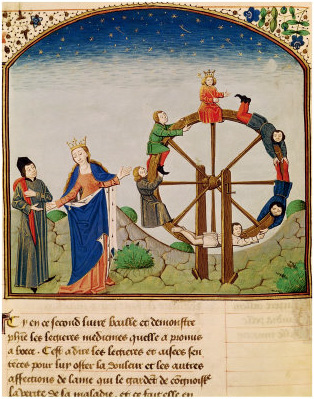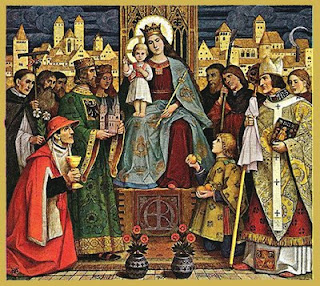Her vindication, then, comes from her children, presumably the saints in Heaven in a Christian context.
Here are the readings:
Reading 1 1 Cor 12:31-13:13
Brothers and sisters:
Strive eagerly for the greatest spiritual gifts.
But I shall show you a still more excellent way.
If I speak in human and angelic tongues
but do not have love,
I am a resounding gong or a clashing cymbal.
And if I have the gift of prophecy
and comprehend all mysteries and all knowledge;
if I have all faith so as to move mountains,
but do not have love, I am nothing.
If I give away everything I own,
and if I hand my body over so that I may boast
but do not have love, I gain nothing.
Love is patient, love is kind.
It is not jealous, love is not pompous,
it is not inflated, it is not rude,
it does not seek its own interests,
it is not quick-tempered, it does not brood over injury,
it does not rejoice over wrongdoing
but rejoices with the truth.
It bears all things, believes all things,
hopes all things, endures all things.
Love never fails.
If there are prophecies, they will be brought to nothing;
if tongues, they will cease;
if knowledge, it will be brought to nothing.
For we know partially and we prophesy partially,
but when the perfect comes, the partial will pass away.
When I was a child, I used to talk as a child,
think as a child, reason as a child;
when I became a man, I put aside childish things.
At present we see indistinctly, as in a mirror,
but then face to face.
At present I know partially;
then I shall know fully, as I am fully known.
So faith, hope, love remain, these three;
but the greatest of these is love.
Strive eagerly for the greatest spiritual gifts.
But I shall show you a still more excellent way.
If I speak in human and angelic tongues
but do not have love,
I am a resounding gong or a clashing cymbal.
And if I have the gift of prophecy
and comprehend all mysteries and all knowledge;
if I have all faith so as to move mountains,
but do not have love, I am nothing.
If I give away everything I own,
and if I hand my body over so that I may boast
but do not have love, I gain nothing.
Love is patient, love is kind.
It is not jealous, love is not pompous,
it is not inflated, it is not rude,
it does not seek its own interests,
it is not quick-tempered, it does not brood over injury,
it does not rejoice over wrongdoing
but rejoices with the truth.
It bears all things, believes all things,
hopes all things, endures all things.
Love never fails.
If there are prophecies, they will be brought to nothing;
if tongues, they will cease;
if knowledge, it will be brought to nothing.
For we know partially and we prophesy partially,
but when the perfect comes, the partial will pass away.
When I was a child, I used to talk as a child,
think as a child, reason as a child;
when I became a man, I put aside childish things.
At present we see indistinctly, as in a mirror,
but then face to face.
At present I know partially;
then I shall know fully, as I am fully known.
So faith, hope, love remain, these three;
but the greatest of these is love.
Gospel Lk 7:31-35
Jesus said to the crowds:"To what shall I compare the people of this generation?
What are they like?
They are like children who sit in the marketplace and call to one another,
'We played the flute for you, but you did not dance.
We sang a dirge, but you did not weep.'
For John the Baptist came neither eating food nor drinking wine,
and you said, 'He is possessed by a demon.'
The Son of Man came eating and drinking and you said,
'Look, he is a glutton and a drunkard,
a friend of tax collectors and sinners.'
But wisdom is vindicated by all her children."
------
Saint Paul reflects: "When I was a child, I used to talk as a child,
think as a child, reason as a child;
when I became a man, I put aside childish things.
At present we see indistinctly, as in a mirror,
but then face to face.
At present I know partially;
then I shall know fully, as I am fully known.
So faith, hope, love remain, these three;
but the greatest of these is love."
He makes some strong claims here. He discusses when he was a child, doing childish things until he became a man and put those aside; that is to say, he matured and left childish reasoning aside. This resonates with what he earlier in 1 Cor. 3:2 - "I gave you milk to drink, not solid food; for you were not yet able to receive it. Indeed, even now you are not yet able" Here, Saint Paul is highlighting the maturity necessary to really contemplate the things of God; there is a growing process involved such that, as you can't give to children meat to eat, so you can't give the deeper contemplations of God to children to contemplate. Saint Augustine, in his 1st Tractate on the Gospel of John (1:1-5), he notes on contemplating one of the most eloquent and difficult passages regarding the Incarnation and the Person of Christ, "The evangelist says, "In the beginning was the Word;" and you say, "In the beginning the Word was made." He says, "All things were made by Him;" and you say that the Word Himself was made. The evangelist might have said, "In the beginning the Word was made:" but what does he say? "In the beginning was the Word." If He was, He was not made; that all things might be made by it, and without Him nothing be made. If, then, "in the beginning the Word was, and the Word was with God, and the Word was God;" if you can not imagine what it is, wait till you are grown. That is strong meat: receive milk that you may be nourished, and be able to receive strong meat." (12) He similarly notes a bit later, "For these things are not spoken by me who am small; He is not small to whom I refer in saying these things. Let each one take in what he can, and to what extent he can; and he who is not able to take in any of it, let him nourish his heart, that he may become able. How is he to nourish it? Let him nourish it with milk, that he may come to strong meat. Let him not leave Christ born through the flesh till he arrive at Christ born of the Father alone, the God-Word with God, through whom all things were made; for that is life, which in Him is the light of men." (17)
I conclude, then, that Saint Paul holds a certain contempt towards that of a child...we must grow into men, putting aside the childish things. For as children, we see indistinctly, as in a mirror. Yet, when we truly achieve that mystical contemplation, we see the Blessedness of God, as he is, face to face. That is the privilege of the saints of Heaven. "And they shall see his face: and his name shall be on their foreheads." (Rev. 22:4) The same Saint Augustine notes in the City of God that "Such also is now the vision of the holy angels, who are also called our angels, because we, being rescued out of the power of darkness, and receiving the earnest of the Spirit, are translated into the kingdom of Christ, and already begin to belong to those angels with whom we shall enjoy that holy and most delightful city of God of which we have now written so much." (XXII, 29). This the Angelic Doctor confirms in the Summa Contra Gentiles. He notes that only the fullness of the Beatific Vision satisfies this fundamental desire of the human soul to know God. Quoting St Paul, Aquinas notes "We see now in a glass darkly, but then face to face" (i Cor. 13:12). The Beatific Vision is the final reward for those saints elect by God to partake in and "enjoy the same happiness wherewith God is happy, seeing Him in the way which He sees Himself" in the next life.
This is contrasted then by one of Christ's many praises of children that appears in the Gospel. Here Christ promises that Wisdom will be vindicated by her children. There is no doubt that we can equate wisdom with Christ the Divine Logos. One can assert that “wisdom” refers to Christ, as Proverbs 8:22 and Wisdom 7:26 suggest, and the phrase “her children” refers to “wisdom’s children,” which is a Hebrew way of saying “wise men,” then this Gospel phrase praises the saints. As Saint Hippolytus notes, "Christ, he means, the wisdom and power of God the Father, has built His house, i.e., His nature in the flesh derived from the Virgin, even as he (John) has said beforetime, "The Word became flesh, and dwelt among us." As likewise the wise prophet testifies: Wisdom that was before the world, and is the source of life, the infinite "Wisdom of God, has built her house" by a mother who knew no man—to wit, as He assumed the temple of the body. "And has raised her seven pillars; "that is, the fragrant grace of the all-holy Spirit, as Isaiah says: "And the seven spirits of God shall rest upon Him," But others say that the seven pillars are the seven divine orders which sustain the creation by His holy and inspired teaching; to wit, me prophets, the apostles, the martyrs, the hierarchs, the hermits, the saints, and the righteous." (Fragments from the Scriptural Commentaries of Hippolytus, Second fragment, on Proverbs 9:1).
To be a child before the Wisdom of God is to be praised. The apparent (and minor I realize) contradiction can be reconciled in St. Paul's epistle. In 1 Cor. 1:20 he condemns earthly wisdom: "Where is the wise? where is the scribe? where is the disputer of this world? hath not God made foolish the wisdom of this world?" Only a mere chapter later, he lauds Divine wisdom in contrast to earthly wisdom when he writes: "But we speak the wisdom of God in a mystery, even the hidden wisdom, which God ordained before the world unto our glory." (1 Cor. 2:7).
We must grow in maturity and wisdom and cast away the childish ways of thinking, the earthly wisdom. At the same time, we must remain a child before the mystery of God's hidden wisdom for the true maturation is complete and finalized (has reached its end) in the Beatific Vision in Heaven where we eat the meat; and this Kingdom of God is only open to those who convert and "become as little children." (Matt. 18:3)




No comments:
Post a Comment